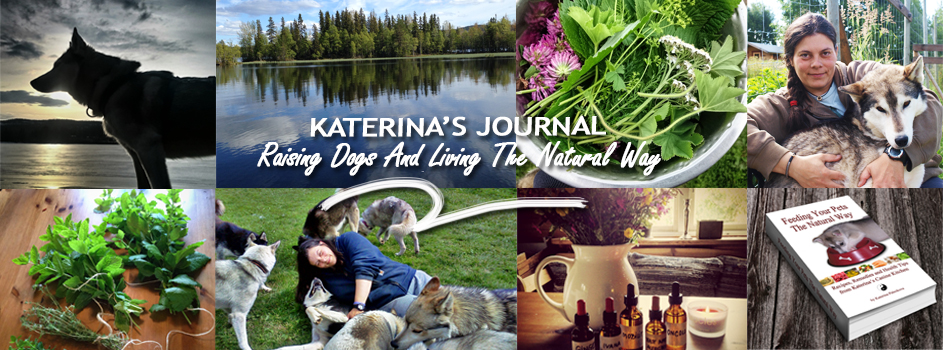 When Canadian pet nutrition blogger and natural animal nutrition advocate Rodney Habib offered me to post some of his earlier articles on healthy, natural nutrition, I jumped at the opportunity with big excitement.
When Canadian pet nutrition blogger and natural animal nutrition advocate Rodney Habib offered me to post some of his earlier articles on healthy, natural nutrition, I jumped at the opportunity with big excitement.In the past I have already written about health benefits and nutritional values of various ingredients, herbs and supplements, most recently for example about the Coltsfoot, Dandelion, Fireweed, Pumpkin, or Cinnamon and Honey.
Today, I am bringing you the first "guest post" by Rodney and because it´s winter time and nutritional needs of many animals are higher due to the cold but also many dogs are very active and hard working - as sled dogs, accompanying their owners on cross country ski or bike trips, or enjoy longer walks in the woods, as the colder weather fits some breeds more, I opted for an article on benefits and nutritional values of eggs.
HEALTH TIP OF THE WEEK – EGGS!
by Rodney Habib
 |
| Image courtesy of Rodney Habib |
Protein, the building block for all animal development, is found in both animal and plant material, specifically grains. Meat, Poultry, and Dairy are high quality sources of protein for your pets. Rice, barley, wheat, rye and corn are vegetable sources of protein, but the vegetables and grain protein are of lesser quality than animal protein. Cats need more protein, almost twice as much as dogs.
Enter Eggs –
The ultimate in animal protein is the almighty EGG. The egg has a biological value of almost 100%!
Eggs are not only a great source of protein but also of Vitamin A, Riboflavin, Selenium and they contain almost every essential vitamin and mineral for your pet, making it a terrific boost to your pet’s diet. By giving your pet an egg once a week, you should see an improvement in their coat and fur. The amounts of protein help contribute to a healthy, shiny coat!
Eggs can be lightly scrambled and fed in the mornings for breakfast, hard boiled for lunch or raw at supper time.
The deal with raw eggs can be controversial. Some scientists say that raw white eggs can destroy biotin, although the yolk contains plenty to replenish. Some also say that an enzyme in raw eggs interferes with the absorption of a particular B vitamin, which may lead to skin problems as well as problems with your dog's coat if they are fed over an extended period of time. However, if this is the way you want to go, try not to give your pet a raw egg more than once a week so that it does not affect your pet’s white blood cell count and/or give them an upset tummy. In the end, egg whites are more easily digestible when cooked.
But as great as the EGG is, let us not forget its EGGSHELL!
A terrific source of calcium, the eggshell consists of calcium carbonate (94%), magnesium carbonate (1%), calcium phosphate (1%), and organic matter (4%).
After cleaning the eggshell, bake or boil to dry and then grind away.
One half teaspoon of ground egg shells yields about 2750 mg calcium carbonate, which has 1100 mg of elemental calcium.
Just remember that, when experimenting, at first you can dabble here and there. If you want to add eggshells as a daily regime, make sure you balance your calcium and the phosphorus in your meal to a 1:1 ratio.
Adding eggs to your pet’s food is a healthy delicious treat. If you do a lot of training with your dog or cat, consider taking cooked eggs to your advanced level “FETCH Inc.” class as a training treat. I’m sure Pro Agility Trainer Brenda Juskow would love the idea. :)
Pet Nutrition Blogger
Rodney Habib
Once again, thank you to Rodney and Planet Paws Essentials for allowing me re-post your work!



No comments:
Post a Comment